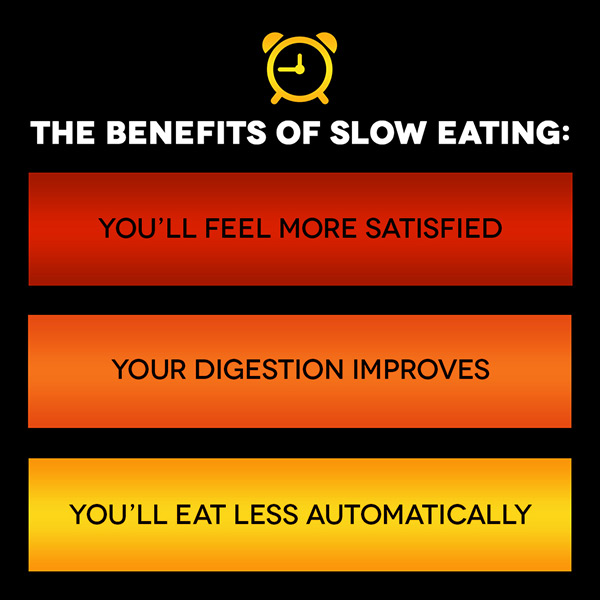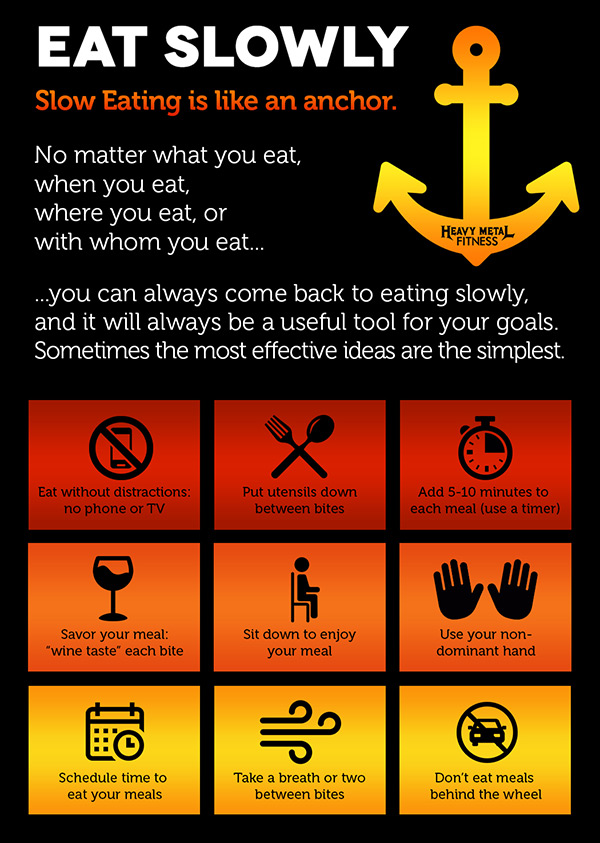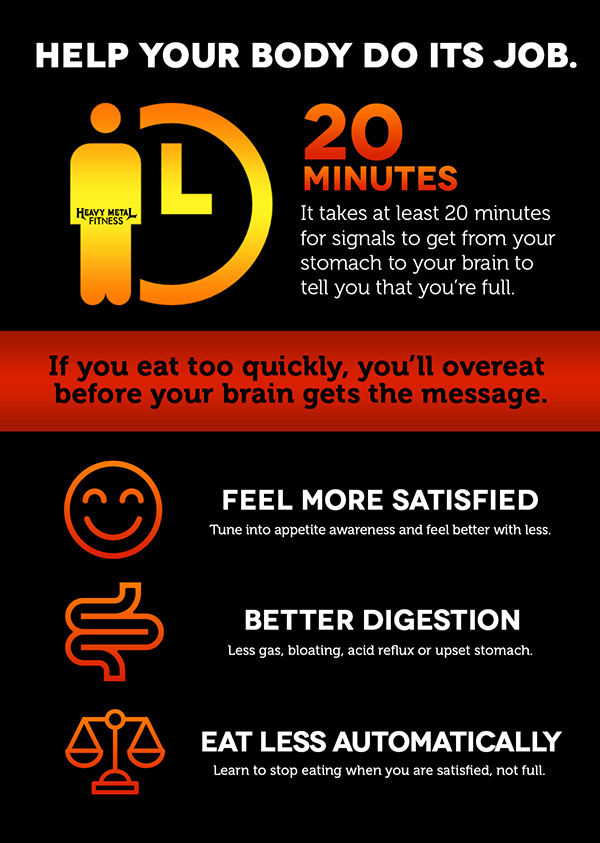When it comes to eating better, most folks worry about the little details first (should I be doing keto? are potatoes bad for me? what’s up with intermittent fasting?)…yet they eat over the kitchen sink. Or in their car. Or in a daze while in front of the TV. And who can blame them? We’ve been taught to think about what we eat, not how we eat. That’s too bad, because eating slowly and mindfully can actually be an incredibly powerful habit for driving major transformation.
When you eat slowly, you digest better. You lose or maintain weight more easily. Yet you also feel more satisfied with each meal. If you rush your meals, your digestion suffers. Meals are stressful. And it might seem like each meal is over too soon, which often makes you want to eat more. Or you “overshoot the runway”, finishing the meal before your natural satiety signals kick in, and ending up suddenly — uncomfortably — overstuffed. Instead of having to figure out which foods to eat, in what frequency, and in what portions—all important factors, of course—eating slowly is the simplest way anyone can start eating and feeling better, immediately. Here’s why.
- PHYSIOLOGY: One of the most important benefits of eating slowly is that it gives your body time to recognize that you’re full. It takes about 20 minutes for your body’s satiety signals to kick in. Slow eating gives the system time to work, allowing you to better sense when you’ve had enough. Imagine the extra calories you could ingest simply because you didn’t allow your body time to register that it no longer required food. When you wolf down your food, you take larger bites and chew less. Your stomach has a harder time breaking down the larger chunks of food, leading to indigestion, bloating, and improper nutrient absorption. Besides making you uncomfortable (maybe even miserable), shoddy digestion can also affect your mindset and energy levels, making you feel less lean.
- PSYCHOLOGY: When you slow down, and really try to savor your meal, you tend to feel more satisfied with less, and feel less “deprived.” Eating slowly leads to smaller portions and fewer calories consumed. Many of us eat when we’re not hungry, and keep eating when we’re full. With regular practice, slow eating with mindfulness improves your appetite awareness and keeps you in the present moment. You learn to recognize and trust your body’s own internal hunger signals while getting the maximum amount of enjoyment from eating. This is the difference between being “on a diet” and learning how to “listen to your body”. When you can’t “hear” what your body is trying to tell you, you can’t properly regulate food intake (or truly enjoy it). If you struggle with binge eating, learning to go slow can help disrupt patterns that derail your progress.
How do you slow down if you’re used to eating fast?
- Take a breath: Before you eat, pause. Take one breath. Take one bite. Then take another breath. Go one bite and one breath at a time.
- Set aside time to eat: At least 20-30 minutes for each meal, and preferably even longer at dinner. Don’t just eat “whenever you get around to it” or treat it as an inconvenience. You’re fueling your body and maybe spending quality time with friends and family. That’s important. It deserves an appointment. Don’t want to “waste time” eating? Try to…
- Add one minute per meal: At the beginning of a meal, start a clock and see if you can make each meal one minute longer than the meal before. There are apps specifically designed for this! Work your way up to adding 5-10 minutes per meal.
- Do something between bites: Pacing yourself is easier when you have a specific action in mind to break up mouthfuls of food. Besides taking a breath (or three), try:
-
- setting down your utensils
- taking a sip of water
- asking someone at the table a question
- Savor your food: “Wine taste” your food. Savor it, enjoy it, ponder it slowly. Really taste it. Is it salty? Sweet? Does it coat the roof of your mouth? What’s the texture like? Think about these questions with each bite.
- Minimize distractions: Sit down to eat in a calm environment. Don’t eat while driving, while watching TV, while texting, etc. Pay attention to your food. This is often a surprisingly difficult task.
- Notice what affects eating speed: Consider factors like who you’re eating with, where you’re eating, and when. Even something as subtle as silence or background music can trigger you to speed up or slow down, which is why some folks have found success with listening to a 20-minute “slow eating” playlist.
- Eat foods that need to really be chewed: High-fiber foods such as fresh fruits and vegetables take more time to chew.
- Pace yourself: Find another slow eater and pace yourselves to them. Picky little kids and chatty dinner companions are often ideal for this. Don’t be the first one to finish the meal.
- Don’t put food on your fork if there’s food in your mouth: Swallow your food before you load that utensil! Use smaller plates or different utensils (such as chopsticks) to slow it down, or place the utensil in your non-dominant hand. If you find yourself rushing, that’s OK. Put your utensils down and take a minute to re-focus.
- Only eat to 80% full: by paying attention to the body’s signals, you can learn to stop eating when you are satisfied, not when you are full. By the time you “feel” full, you might have already overconsumed. Read here for more information »
I know: It sounds too ridiculously simple to work. But it does. If slow eating isn’t habitual for you, this will take practice. But it’s worth it! Get curious. As you practice slowing down, you’ll learn about how and why you’re eating. You’ll be able to see your patterns more clearly, and study specific directed questions about why you do what you do. For example:
- Are you compelled to eat more food, even though the hunger signals have settled? Why could that be?
- Are you making plans for how you’ll act differently after eating this meal (for example, eat less or workout more later)? Is that necessary?
- How are your thoughts and emotions changing throughout the meal (for example, do you get either more excited or more bothered throughout the meal)? Why and when is that change happening?
- Are you enjoying this moment right now? Why or why not, specifically?
Helpful Journals:
If you need a few more question prompts or something to track your accountability, download these helpful journals.




